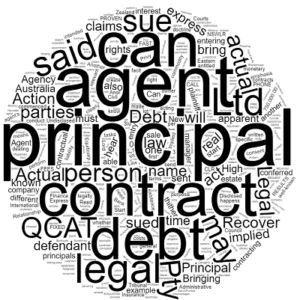Table of Contents
Toggle Legal action to recover debt may be the only option left after trying to negotiate with a debtor.
Legal action to recover debt may be the only option left after trying to negotiate with a debtor.
Sometimes, an agent will incur debts on behalf of a principal and debt recovery action will need to be commenced to recover that debt.
- Can an agent of a principal sue for a debt?
- When can an agent start legal proceedings for debt recovery?
- What is an agent and principal?
The law of agency goes back a long time in history and is complex.
In this article our debt recovery lawyers explain the law of agency and the rights of a principal or an agent start legal action to recover debt.
The Agency Relationship
In the law legal action to recover debt, an “agent” for a principal is a person who can act as though they were the principal in certain circumstances, including entering into legal relationships with third parties.
In International Harvester Company of Australia Pty Ltd v Carrigan’s Hazeldene Pastoral Co [1958] HCA 16; (1958) 100 CLR 644 the High Court of Australia said:
Agency is a word used in the law to connote an authority or capacity in one person to create legal relations between a person occupying the position of principal and third parties.
In the law of legal action to recover debt, in Petersen v Moloney (1951) 84 CLR 91 the High Court defined the agency relationship and said:
The legal conception of agency is expressed in the maxim “Qui facit per alium facit per se”, and an “agent” is a person who is able, by virtue of authority conferred upon him, to create or affect legal rights and duties as between another person, who is called his principal, and third parties.
So, the agency relationship is one where a person (agent) can legally act for another (principal) in legal transactions with another (third party).
In legal action to recover debt, a typical and most well-known agency relationship is that of a real estate property manager:
- The Principal – The owner of the house;
- The Agent – The real estate agent or property manager;
- The Third Party – the lessee or renter of the property.
But there are different types of agent / principal relationship:
- A disclosed principal; and
- An undisclosed principal.
What is a Disclosed Principal?
A disclosed principal is a principal known to exist by the third party at the time of entering into the contract.
A principal will be a disclosed principal (whether specifically identified or not) when the principal’s interest in a transaction is known to the third party at the time of entry into a contract.
This is different to a transaction where the principal’s interest in a transaction is not known to the third party at the time of entry into a contract.
What is an Undisclosed Principal?
A principal will be an “undisclosed” principal when the existence of the principal is not known to the third party at the time of entry into a contract, and the third party likely believes that they are contracting directly with the agent.
In Marsh and McLennan Pty Ltd v Stanyers Transport Pty Ltd [1994] 2 VR 232 Marks J said (with whom Fullagar & Gobbo JJ agreed):
The basis of liability of an agent is clearly explained by Professor Fridman in his Law of Agency, 6th ed., at 228: “An undisclosed principal is one of whose existence the third party is unaware, so that the third party does not know that the person with whom he is dealing is anybody’s agent. As far as he is concerned, the agent is really a principal, dealing on his own behalf, and in his own name, with the third party.”
Whether it is a disclosed principal or an undisclosed principal, the agent must still have authority to act for the principal. There are two (2) kinds of authority:
- Actual authority; and
- Ostensible / apparent authority.
What is Actual Authority?
Actual authority happens when a principal and agent agree to enter into a contractual relationship for the agent to perform specific tasks for the principal.
This actual authority can be both express and implied.
Express Actual Authority
Express actual authority was discussed in Equiticorp Finance Ltd (in liq) v Bank of New Zealand (1993) 32 NSWLR 50 where the Court said:
Actual authority arises where a principal grants and an agent accepts, authority for the agent to perform specific tasks on behalf of the principal — in short there must be a consensual agreement between the principal and agent.
So, clearly express actual authority will usually involve an express written contract allowing the agent to act as agent on behalf of the principal.
Again, a real estate agent’s property manager contract to manage the principal’s real property is a great example.
However, actual authority can also be implied actual authority.
Implied Actual Authority
In legal action to recover debt, authority is implied in an agency / principal relationship where without express agreement, the parties intended the agent to conduct work as agent.
Again in Equiticorp Finance Ltd (in liq) v Bank of New Zealand (1993) 32 NSWLR 50 the High Court of Australia said:
Notwithstanding the absence of an express agreement the parties, that is, the principal and agent, may conduct themselves in such a way that it is proper to infer that the relevant authority has been conferred on the agent.
Examples of implied actual authority could be auctioneers, solicitors, and company officers – there doesn’t need to be a written contract for a company director to act on behalf of the company for example.
Implied actual authority is to be distinguished from ostensible or apparent authority.
What is Ostensible / Apparent Authority?
Ostensible or apparent authority happens when an agent who does not have actual authority, as above, but by the principal’s actions or words, is conferred a “constructive” authority.
In Pickering against Busk and Another, Assignees of Hayward and Another, Bankrupts (1812) 15 East 38 Lord Ellenborough CJ said:
If the principal send his commodity to a place, where it is the ordinary business of the person to whom it is confided to sell, it must be intended that the commodity was sent thither for the purpose of sale. If the owner of a horse sent it to a repository of sale can it be implied that be sent it thither for any other purpose than that of sale? Or if one send goods to an auction-room, can it be supposed that he sent them thither merely for safe custody?
The Agency Relationship – Legal Action to Recover Debt
In legal action to recover debt, the agency relationship means that the parties will need to identify the following:
The parties:
- The principal;
- The agent; and
- The third party.
The principal relationship:
- A disclosed principal; or
- An undisclosed principal.
The appointment:
- Actual authority; or
- Ostensible / apparent authority.
Once a person has ascertained the answers to the above, they are then able to understand which party can sue for a debt.
Can an Agent of a Disclosed Principal Start Legal Action to Recover Debt?
In legal action to recover debt, the well-known doctrine in Australian common law in relation to disclosed principals is well established, and summarised by Lord Lloyd when delivering the judgment of the Privy Council in Siu v Eastern Insurance Co. Ltd [1994] 2 AC 199 in which he said:
[w]here an agent contracts on behalf of a disclosed principal, it is the principal alone who can sue and be sued on the contract … The agent can only bring proceedings if he or she is authorised by the terms of the agency to do so, and then only in the name of the principal.
Further, in Mooney v Williams [1905] ArgusLawRp 107 the High Court of Australia provided authority for the proposition that where a person contracts on behalf of a principal, the principal is the real contracting party and can sue on the contract. The Court said:
The only point decided by the Full Court was whether the plaintiff could be considered a party to the contract, and a majority of the Court held that he could not, because Lycett, when he made the offer, was not acting as agent for the plaintiff.
In Purnell v Tianjin Noble Boats International Pty Ltd [2016] QCAT 524 Adjudicator Mewing said in the Civil and Administrative Tribunal:
In an agency arrangement, there is a contractual relationship between the principal and agent, and between the principal and third party. There is no contractual relationship between the agent and third party. [my emphasis]
Further, in Netage Pty Ltd v Cantley (1985) 6 IPR 200, the Court said:
Under the general law, it is quite unusual for an agent … in whom is vested no proprietary … rights … to bring an action in his own name on behalf of his principal.
In The Owners – Strata Plan No 43551 Walter [2003] NSWSC 1177 Master Macready said:
The general rule on enforcement of a contract by an agent is that the agent can only bring an action to enforce the contract in the name of the principal with the consent of the principal. The agent himself has no cause of action and no interest in the subject matter of the suit. [my emphasis]
In debt recovery, if there is no contract between an agent and a third party then there are no legally enforceable rights under contract, and no obligation for the third party to pay any monies to the agent.
So, an agent for a disclosed principal can only bring an action for debt recovery in the name of the principal, and with consent of the principal.
Can an Agent of an Undisclosed Principal Start Legal Action to Recover Debt?
The undisclosed principal and the agent may both be parties to legal action to recover debt.
In Siu v Eastern Insurance Co. Ltd [1994] 2 AC 199 the Privy Council stated the relevant principals:
(1) An undisclosed principal may sue and be sued on a contract made by an agent on his behalf acting within the scope of his actual authority.
(2) In entering into a contract, the agent must intend to act on the principal’s behalf
(3) The agent of an undisclosed principal may also sue and be sued on the contract.
(4) Any defence which the third party may have against the agent is available against his principal.
(5) The terms of the contract may, expressly or by implication, exclude the principals right to sue, and his liability to be sued The contract itself or the circumstances surrounding the contract, may show that the agent is the true and only principal.
So, an agent for an undisclosed principal can commence legal action to recover debt in the agent’s own name on behalf of the principal, and the principal can also sue.
This statement was accepted to be the law in Queensland in Pico Holdings Inc v Wave Vistas Pty Ltd & Anor [2003] QCA 204 and has been followed in a number of decisions in Queensland.
In Jong v New World Construction Pty Ltd & Anor [2014] QCAT 132 Member Burke said:
An agent may become liable in circumstances applicable to the doctrine of an undisclosed principal which permits an undisclosed principal to sue and be sued on a contract to which the undisclosed principal is not a party. It is an exception to the principle of privity of contract and thus enables a third party to sue either the undisclosed principal or the agent on the contract.
In Jebts Pty Ltd v Dial-A-Plumber (Qld) Pty Ltd [2008] QCCTB 144 Mr C Coyne said:
An undisclosed principal may sue or be sued on a contract to which the undisclosed principal is not a party.
In Daphne Pty Ltd v. Landmara Pty Ltd & Ors [2007] QDC 169 McGill DCJ said:
In such circumstances the first defendant would have been contracting as agent for an undisclosed principal, and the plaintiff is entitled to sue the undisclosed principal, and not just pursue the first defendant (which would in any event no doubt be entitled to recover from the third defendant). If in such circumstances the third defendant has overpaid the second defendant, that would then be the third defendant’s problem.
But what legal action to recover debt can an agent or principal bring in Queensland.
Legal Action to Recover Debt
Legal proceedings for debt recovery can be commenced in the following ways:
- Bringing legal action to recover debt in QCAT;
- Bringing legal action to recover debt in the Court.
The Courts and QCAT have different monetary jurisdictions and so it is important that an agent or a principal know where they can start debt recovery action.
Bringing Legal Action to Recover Debt in QCAT
The Queensland Civil and Administrative Tribunal or (“QCAT”) is essentially the small claims court in Queensland.
QCAT can hear debt matters up to $25,000.00.
The advantages of commencing proceedings in QCAT are:
- It can be a lot less expensive than the Court;
- QCAT is designed for self-represented people;
- The process can be a lot quicker than the Court;
The disadvantages of commencing proceedings in QCAT are:
- The minor debt jurisdiction is mostly a no costs jurisdiction. This means that you will not be able to recover your legal costs;
- Small claims lawyers do not have an automatic right of appearance. This means that a lawyer might not be given permission to appear.
Read more about legal proceedings for debt recovery in QCAT here – https://stonegatelegal.com.au/qcat-applications/
Bringing Legal Action to Recover Debt in the Court
Debt recovery action can also be brought in the Court with jurisdiction.
The monetary jurisdiction of the Courts are:
- Magistrates Court can hear debt recovery claims up to $150,000.00;
- District Court can hear debt recovery claims up to $750,000.00;
- Supreme Court can hear debt recovery claims over $750,000.00;
Read more about commencing legal action to recover debt in the Court here – https://stonegatelegal.com.au/services/debt-disputes/.
Legal Action to Recover Debt by an Agent FAQ
There are some interesting questions to consider when thinking about legal action to recover debt by an agent. Here are a few frequently asked questions.
What is an “agent”?
At law, an “agent” for a principal is a person who can act as though they were the principal in certain circumstances, including entering into legal relationships with third parties.
What is a Disclosed Principal?
A disclosed principal is a principal known to exist by the third party at the time of entering into the contract.
A principal will be a disclosed principal (whether specifically identified or not) when the principal’s interest in a transaction is known to the third party at the time of entry into a contract.
What is an Undisclosed Principal?
A principal will be an “undisclosed” principal when the existence of the principal is not known to the third party at the time of entry into a contract, and the third party likely believes that they are contracting directly with the agent.
What is Actual Authority?
Actual authority happens when a principal and agent agree to enter into a contractual relationship for the agent to perform specific tasks for the principal. This actual authority can be both express and implied.
What is Express Actual Authority?
Actual authority arises where a principal grants and an agent accepts, authority for the agent to perform specific tasks on behalf of the principal — in short there must be a consensual agreement between the principal and agent. So, clearly express actual authority will usually involve an express written contract allowing the agent to act as agent on behalf of the principal.
What is Implied Actual Authority?
Authority is implied in an agency / principal relationship where without express agreement, the parties intended the agent to conduct work as agent.
What is Ostensible / Apparent Authority?
Ostensible or apparent authority happens when an agent who does not have actual authority, as above, but by the principal’s actions or words, is conferred a “constructive” authority.








